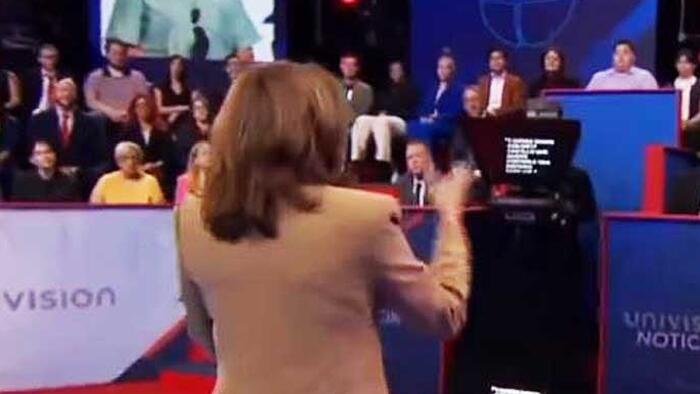At a recent Town Hall event hosted by Univision, Kamala Harris faced scrutiny over allegations that she used a teleprompter, which undermined the supposed spontaneity typically expected in this format. The event aimed at engaging undecided Latino voters in Las Vegas reportedly included a teleprompter that displayed Harris’s introduction in Spanish before switching to a timer. This led to accusations of insincerity, especially when she appeared unaware of the teleprompter’s presence during the live broadcast. The unfolding events have sparked a heated debate on social media, with some claiming that Harris’s reliance on the device diminishes her credibility as a candidate.
In response to allegations raised by various media personalities, particularly those affiliated with conservative viewpoints, Enrique Acevedo, the Univision host, firmly denied that Harris was using a teleprompter to deliver her responses. He stated that the prompter was only used for the introduction and wouldn’t have influenced her answers. Nonetheless, several critics have seized this opportunity to question Harris’s authenticity, citing moments from the Town Hall where she provided convoluted answers that seemed to lack direct engagement with voter concerns. These instances were shared widely across platforms, with opponents labeling Harris as disconnected from the realities faced by everyday Americans.
Historically, the role of a candidate in a Town Hall setting involves direct, real-time interaction with constituents, allowing voters to gauge their responses to pressing issues. However, the appearance of a teleprompter during Harris’s event raised eyebrows, as Town Halls are generally expected to showcase candidates thinking on their feet. Critics expressed outrage over what they perceived as a breach of trust, arguing that such preparations betray the nature of a Town Hall’s intended candidness. As video clips began circulating online, so did accusations of “journalistic malpractice” directed at Univision, questioning how such a blatant use of a teleprompter could go unnoticed during the production.
Additionally, reactions to Harris’s responses during the event have further fueled perceptions of her being out of touch. When asked about rising living costs affecting the middle class, Harris’s answer about her working-class background seemed to overshadow the actual question posed by the voter, leading to perceptions of her as evasive. Social media critiques underscored that instead of addressing specific concerns, she reverted to general statements about her upbringing, raising doubts about her ability to empathize with constituents directly. Such responses are part of a broader narrative that paints Harris as insincere, lacking the depth of understanding needed to connect with voters during critical conversations.
In another point of contention, Harris’s shift in accent while addressing the audience has been met with mixed reactions. Critics highlighted her attempt to adopt a Spanish accent, reminiscent of a previous appearance on a talk show, as performative, questioning its authenticity. This change reflected a trend of politicians sometimes adopting accents or behaviors perceived as relatable to specific voter demographics, fueling further accusations of inauthenticity. Many commentators have noted that audiences increasingly view such tactics as transparent attempts to gain favor rather than genuine efforts at engagement.
Ultimately, the fallout from the Univision Town Hall has given Harris’s critics new ammunition. The incident points to larger discussions about political authenticity, the expectations of public figures in direct voter interactions, and how modern campaigning methods might conflict with traditional notions of connecting with constituents. As the political landscape evolves leading up to future elections, the implications of authenticity—real or perceived—could play a pivotal role in shaping voter opinions and behavior, particularly among demographic groups like Latino voters who may feel marginalized by superficial posturing from candidates. This incident may serve as a warning for politicians about the risks of appearing disingenuous in an age where voters demand transparency and sincerity.

